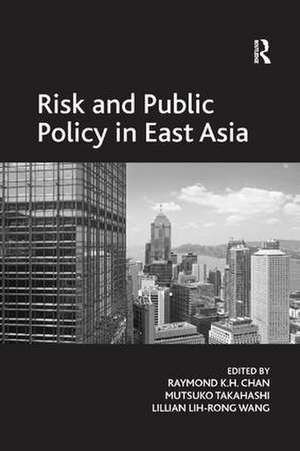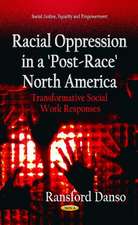Risk and Public Policy in East Asia
Autor Mutsuko Takahashi Editat de Raymond K. H. Chanen Limba Engleză Paperback – 17 noi 2016
| Toate formatele și edițiile | Preț | Express |
|---|---|---|
| Paperback (1) | 455.78 lei 43-57 zile | |
| Taylor & Francis – 17 noi 2016 | 455.78 lei 43-57 zile | |
| Hardback (1) | 1059.45 lei 43-57 zile | |
| Taylor & Francis – 28 dec 2010 | 1059.45 lei 43-57 zile |
Preț: 455.78 lei
Nou
Puncte Express: 684
Preț estimativ în valută:
87.24€ • 89.90$ • 73.65£
87.24€ • 89.90$ • 73.65£
Carte tipărită la comandă
Livrare economică 03-17 martie
Preluare comenzi: 021 569.72.76
Specificații
ISBN-13: 9781138267978
ISBN-10: 113826797X
Pagini: 252
Dimensiuni: 156 x 234 x 13 mm
Greutate: 0.45 kg
Ediția:1
Editura: Taylor & Francis
Colecția Routledge
Locul publicării:Oxford, United Kingdom
ISBN-10: 113826797X
Pagini: 252
Dimensiuni: 156 x 234 x 13 mm
Greutate: 0.45 kg
Ediția:1
Editura: Taylor & Francis
Colecția Routledge
Locul publicării:Oxford, United Kingdom
Notă biografică
Raymond K.H. Chan, Associate Professor, Department of Applied Social Studies, City University of Hong Kong, Hong Kong; Mutsuko Takahashi, Professor, Graduate School of International Cooperation and Development, Kibi International University, Japan and Lillian Lih-rong Wang, Professor, Department of Social Work & Director, Social Policy Research Center, National Taiwan University, Taiwan
Recenzii
'This excellent book should be required reading for students of social and public policy. It breaks new ground by examining the concepts of risk and risk management in an East Asian context. A thorough theoretical foundation at the start provides the reference point for specific case studies, helpfully grouped into integrated sections, which together create a comprehensive picture of the key issues concerning risk and risk regulation in East Asia.' Alan Walker, University of Sheffield, UK 'Risk and Public Policy in East Asia is a welcome addition to the comparative social policy literature. While the economic underpinnings of Japan, South Korea, Taiwan and Hong Kong have been examined, too little attention has been paid to their social innovations. This book reveals the diverse ways these important countries are responding to new (and old) social risks.' Rianne Mahon, Balsillie School of International Affairs, Canada 'East Asian economic developments rather than welfare systems have traditionally formed the focus of scholarly attention on the region. With the development of policies responding to rapid social changes in this region, this stimulating book analyzes public policy in terms of the risk society and is an essential book for all those studying East Asian public policy.' Shogo Takegawa, University of Tokyo, Japan
Cuprins
Chapter 1 Introduction: Risk and Public Policy in East Asia, Raymond K.H. Chan, Mutsuko Takahashi, Lillian Lih-rong Wang; Part I Risk and Risk Regulation: Concepts and Practices; Chapter 2 The Relevance of Social Science Approaches to Risk for Social Policy Research, Jens O. Zinn; Chapter 3 1 The author would like to thank Julia Howe and Attila Szanto for their excellent research assistance in preparing for this chapter., Bridget M. Hutter; Part II Risk and Family Changes; Chapter 4 Risks, Family, and Gender Justice in Contemporary Japan, Mutsuko Takahashi; Chapter 5 1 The research was the part of ‘Gender Equality and Multicultural Conviviality in the Age of Globalization’ (Global COE Project, Head investigator: Mari Osawa) and ‘A Comparative Study of Care Regime and Social Integration in East Asia’, supported by Grant-in-Aid for Scientific Research (B: No.21310168) from the Japanese Society for the Promotion of Science (JSPS). I thank Song Dayoung for her help, and helpful comments and suggestions from the editors, Mari Osawa, Heidi Gottfried, Karin Gottschall, Sawako Shirahase, Karen Shire, Kim Young, Kim Sujeong, Hwang Jungmee and Baek Sunhee on earlier versions of this chapter., Naoko Soma; Chapter 6 New Social Risks and Family Change in Taiwan, Tsung-hsi Fu, Rhidian Hughes; Chapter 7 Managing Family Risks in Hong Kong: How and Why, Raymond K.H. Chan; Chapter 8 Managing Family-Related Risks in East Asia, Lillian Lih-rong Wang; Part III Risk, Work and Socio-Economic Security; Chapter 9 Unemployment and the Government’s Role in a Risk Society: A Case Study in Taiwan, Fen-ling Chen; Chapter 10 Managing Risks During a Financial Crisis: Promises and Fallacies of the Productive Welfare Model in Hong Kong, Raymond M.H. Ngan; Chapter 11 Managing or Generating New Social Risks? Labour Market Changes and the Japanese Welfare Regime, Junko Yamashita; Chapter 12 Comments on Socio-economic Security in Four East Asian Societies, Dukjin Chang; Part IV Risk and its Governance; Chapter 13 Risk Governance in a Double Risk Society: From System Failure to Unknown Complexities, Jaeyeol Yee; Chapter 14 1This research was supported by two grants from the National Science Council, Taiwan (project number: NSC 95-2625-Z-194-001, and NSC 96-2923-I-194-001-MY2). I would like to thank Raymond K.H. Chan and Jen-Der Peter Lue for their constructive comments, to Jun-Rong Chen for his positive feedback at the early stage of this research; and to Chia-Yu Yang for his excellent work of data computing., Hsiu-Jen Jennifer Yeh; Chapter 15 Risk and the Emergence of New Subpolitics in Japan, Ki-young Shin; Chapter 16 1This chapter is a part of a research project supported by the grant from the National Research Foundation of Korea (project number: KRF 2007-411-J01602)., Jen-der Lue;
Descriere
Contemporary Asian society is marked by social processes associated with the loss of stable economic growth and high employment; family structures capable of caring for family members in need; and governmental economic and political competence. Against this backdrop, this volume offers a timely review of these critical issues, offering an introduction of the concepts and theoretical approaches of risk and risk and governance that places them within the context of Asian societies.










